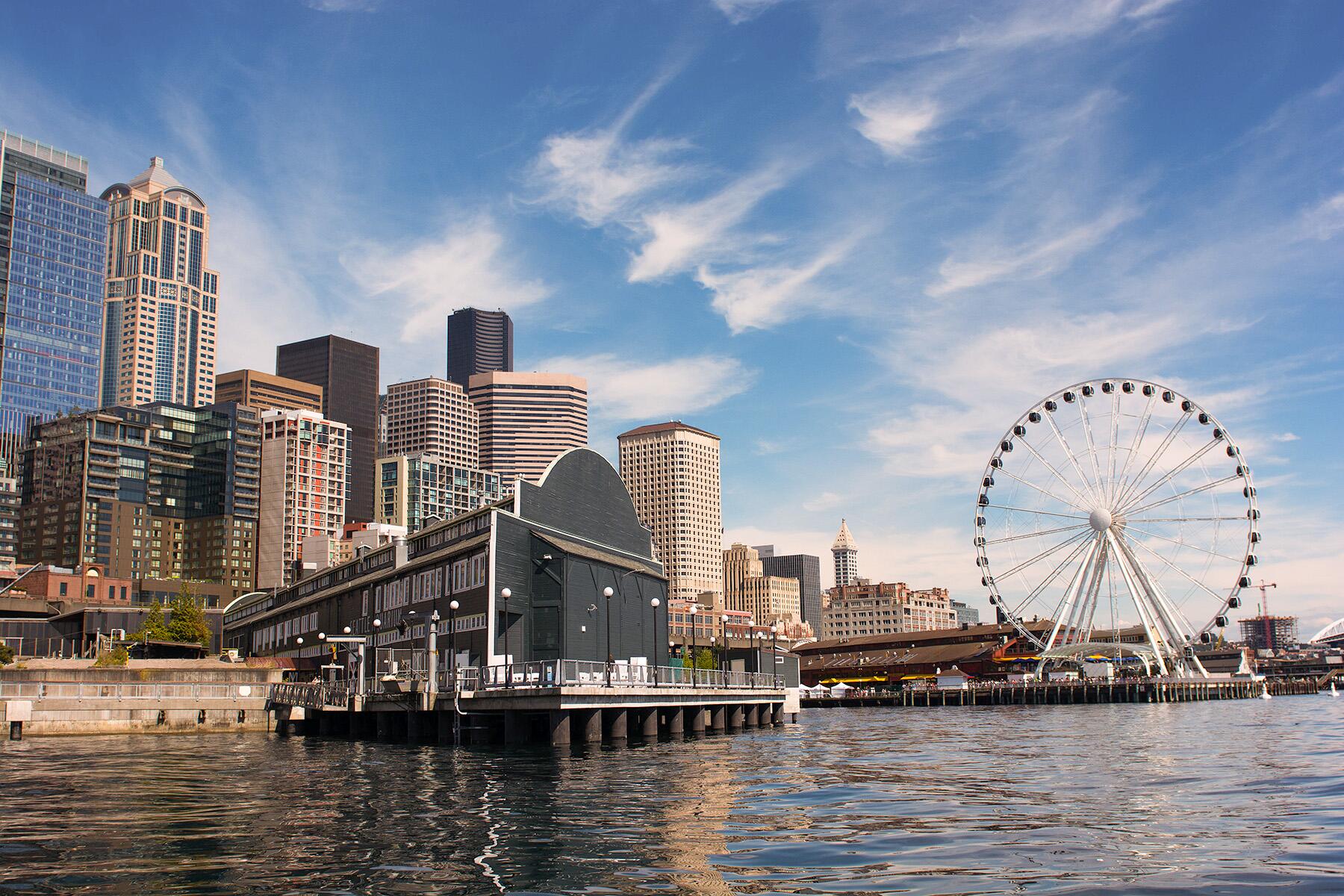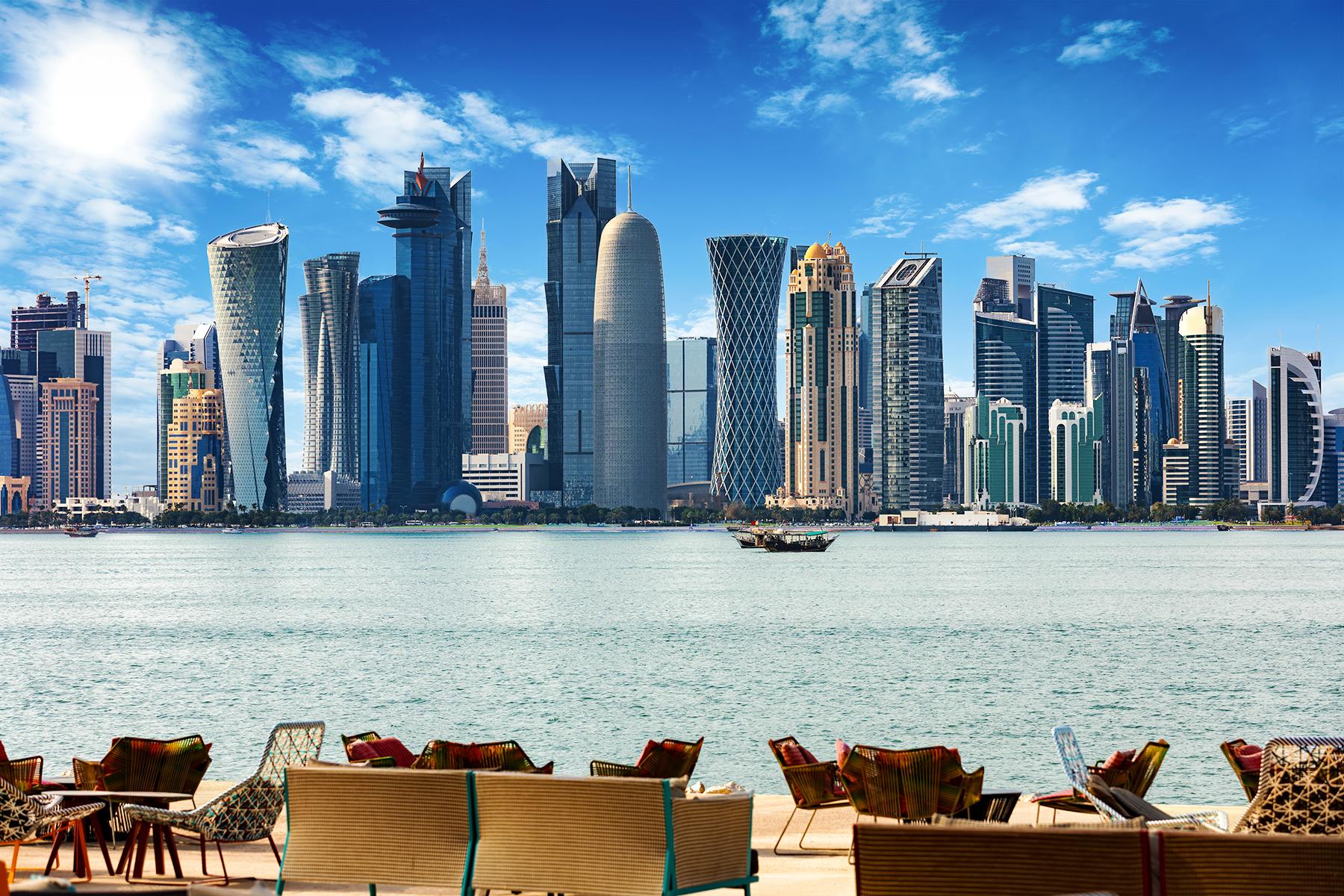- ⁄
- Travel News
- ⁄
- Travel Tips •
- Trip Ideas
Plan the perfect trip to Qatar, an excellent entry-level destination for Americans who want to explore the Middle East.
It’s hard to believe that the Doha we see today, with its glittering skyline and dozens of luxury hotels and malls, is only about 40 years old. Qatar, which will host the World Cup in 2022, was a center for the pearl trade in the early 20th century until oil was discovered in the late 1930s. Long a British protectorate, it only achieved full independence in 1971. Since then, the small kingdom has positioned itself as an up-and-coming competitor to Dubai. Busy building mass-transit systems, luxury hotels, giant shopping malls, a sprawling airport, and major museums, the small kingdom, which occupies a peninsula between Saudi Arabia and the United Arab Emirates, has brought in a veritable army of noteworthy international architects to build recent and upcoming projects (Sir Norman Foster, Rem Koolhaas, Zaha Hadid, Jean Rousel, I.M. Pei, among many others). You may know Doha as the home to Al Jazeera, the Middle Eastern alternative to CNN, but it’s a fascinating city and a good entry point if you want to dip your toes into the Middle East, with vast deserts to explore, beautiful beaches to lay on, excellent (and free) museums, and a cultural scene befitting a much larger country, not to mention plenty of Arab hospitality. If you decide to go, here’s what you need to know to make the most of your trip.
Know the Entry Requirements
U.S. citizens should have a passport valid for at least six months from the date of travel. On arrival (provided that you have a valid onward or return ticket), you’ll be granted a free multi-entry visa waiver for 30 days (which is renewable for another 30 if you need to stay longer). Citizens of 80 countries, including Canada, Australia, New Zealand, the U.K., and all other Schengen countries in Europe are also eligible for the free visa-waiver program. If your country isn’t on the visa-waiver list, you can apply for an e-visa online. If you are a transit passenger on Qatar Airways, you can apply for a free transit visa (valid for 5- 96 hours) that will allow you to make a quick visit to the country during a stopover. The only limitation is that you must build the stopover into your Qatar Airways itinerary when you buy your ticket (and apply online in advance). If you’re doing a stopover, you should get the transit visa rather than the free visa waiver on arrival regardless of your nationality and eligibility for the visa-waiver program.
Know Who to Contact if You Need Help
The United States has an embassy in Doha at 22nd February St., Al Luqta District (Tel. 946/4496–6000), which provides consular services to U.S. citizens. This is who you call if you lose your passport, get arrested, or need other official U.S. government help during your trip. But if you do need help, call and make an appointment; you can’t just drop in.
Recommended Fodor’s Video
What You Need to Know about the Embargo
What embargo, you ask? In June 2017, four countries (Bahrain, Egypt, Saudi Arabia, and the United Arab Emirates) cut off diplomatic relations with Qatar and began an air, sea, and land embargo of the country. Six other countries, including Maldives and Senegal, severed diplomatic relations, though three of them have since restored their ties. Qatar still controls its own international air and sea space, so the embargo was not a complete blockade, but no one can pass through the country’s only land border (with Saudi Arabia), and ships and planes must make detours to avoid routes that have been cut off. More than eighteen months later the embargo shows no signs of resolution. So what does this mean for travelers? To be honest, you may not notice. Your flight may be slightly longer because of less direct air routes, and you won’t be able to make a connecting flight to any of the four major countries involved in the blockade, though flights continue to the Maldives, which has since restored full diplomatic relations with Qatar. Cruises continue to call on Doha along with Bahrain and the United Arab Emirates. You’ll also see more Turkish and Iranian brands in supermarkets and drug stores (rather than the Saudi brands that dominated the commercial scene before the embargo), and there are now local producers of such mundane items as toilet paper and dish soap (and more famously milk), which was not the case before. You won’t find Al Jazeera or other Qatar TV stations or web sites available in any of the four countries that uphold the full embargo, and Qatar announced in late 2018 that it would withdraw from OPEC. The most happy development for travelers has probably been lower hotel rates, since the big luxury hotels are not filled with Saudi business travelers and families any longer (though hotels continue to be busy, especially during the winter high season and on weekends).
Know How to Fit In
Qatar is an Arab country, where virtually everyone except for expat workers is a Muslim. While it’s relatively “liberal” (alcohol is allowed but restricted, Western films play at the movie theaters, non-Muslims are allowed to visit mosques), visitors are still expected to comport themselves in a way that doesn’t offend the locals. This means no PDAs, no drinking alcohol outside of a licensed bar in a hotel (or in a private home), and modest dress in public. Women especially should dress modestly, keeping their shoulders covered, never wearing anything too tight, and making sure that skirts or shorts fall below the knee. Similarly, men shouldn’t wear tank tops or shorts above the knee outside of a beach resort. Local men will likely be dressed modestly, some in traditional Arab dress called a thobe along with a gutra (or keffiyeh, the loose head-covering worn in the Gulf); women may wear traditional clothing or not, but don’t be surprised if you see a lot of women wearing either a hijab (headscarf) or burqa (covering both the body and the face). If you visit a mosque, men should not wear shorts, and women will be expected to put on an abaya (a traditional, full body robe-style dress) and hijab, which will be available for loan at the entrance. Women and men will also visit mosques separately since each sex has its own entrance. The penal code is fairly strict on modesty, but Westerners are not generally held to the same standards as locals.
Plan for the Best Weather
If you’re coming to Qatar during the winter months (roughly December through mid-March), then congratulations. You’ll likely find temperatures in the comfortable 70s or low 80s during the day and in the 50s or 60s at night (and it’s often cooler in the desert at night than in Doha). Of course, it’s not unheard of to see temps reach 90 degrees during the winter, but it’s not common. But by late March, daytime temperatures almost consistently hit 90 degrees. Even in November or mid-April, the average daytime temperatures may still be in the 80s (and as they say, it’s a dry heat), while a hot day can hit the mid-90s. But from late April through October, you can always expect daytime temperatures to hit 90 degrees or more, and from May through August, the average daytime temperature is over 100, with temperatures of 120 degrees or higher not being uncommon. At that point, the lack of humidity isn’t going to make you feel much better, and you’ll want to retreat to an air-conditioned mall during the day–there’s even one modeled on Venice. Three downtown hotels have a direct connection to the City Center Mall, so you don’t even have to go outside.
Understand That Alcohol Is Complicated
Unlike in Saudi Arabia and Kuwait, alcohol is allowed in Qatar, though its availability and cost are both strictly controlled. What this means is that drinking in Doha can only be done in licensed hotels (typically large international chains) and the restaurants attached to them. You can’t buy duty-free alcohol in the airport, nor can you bring alcohol in from outside the country. Qatar has but a single liquor distributor, which is government owned. Things got a bit more expensive in 2019, when the country instituted a new 100% tax on the previous sale price of all alcohol, doubling the cost of a six-pack of beer to about $26. (The new 100% tax also applies to cigarettes and energy drinks; soda got a new 50% tax.) Before the new tax, a basic alcoholic drink or glass of wine in a restaurant might cost $15 or more; prices will certainly increase, but will probably not double. Needless to say, happy hour is especially popular. The other happy side-effect of expensive alcohol is a diverse and interesting list of mocktails and fruit juices available at most restaurants, as well as the ubiquitous (and delicious) mint lemonade.
Consider Yourself Safe
How little crime is there in Qatar? In a country where bouncing a check is a felony, you can be assured that crime is taken seriously. You can walk along the Corniche at night without a care in the world. You can shop in Souq Waqif and not worry about holding onto your wallet in your back pocket. It’s not that pickpocketing or petty crime doesn’t ever occur, but it’s certainly not a major concern, and if you are comfortable walking around your hometown, you’ll feel just as much at home in Doha. A visitor can leave her laptop and bag in the middle of a busy hotel lobby and go off to get a coffee; when she comes back, it will still be there, likely untouched. The country is consistently ranked as the safest country in the Middle East, which it’s been since 2009. Traffic accidents are a much more common concern than violent crime. Still, this is the Middle East, so there is always a threat of terrorism, but the U.S. Department of State considers Qatar a Level 1 destination (it’s lowest alert level) with regard to safety.
Getting Around
Visitors over 21 with a valid driver’s license are allowed to rent a car in Qatar, but it’s probably not a good idea. Traffic is heavy during rush hours and on weekends, and traffic rules can be arcane and heavily enforced (including with traffic cameras). Given that Uber is relatively easy to use and inexpensive (and that there are plenty of guided tours to show you around), it’s probably better to leave the driving to someone else, especially for a reasonably short trip. A major new metro system is being developed in conjunction with planning for the World Cup; it should be fully operational by 2022, but one line is planned to open in 2019. When the weather is not too hot, you can walk in some parts of Doha. A pedestrian Corniche winds around the bay almost uninterrupted between the port and West Bay, passing many of the major seafront hotels. Stoplights are present downtown, but heavy traffic and numerous construction sites make walking less than ideal. Much of the area around Souq Waqif is pedestrianized.
You Can Get Luxury Hotels for Less
A five-star hotel room can be found for most of the year for $250 a night and often quite a bit less. On the higher end are the Four Seasons, Sheraton Grand, W, and Shangri-La. Another group of perfectly nice hotels are often in the $150 or less range, including the Grand Hyatt, Marriott Marquis, Mondrian, and InterContinental. Three-star hotels are well under $100 per night year-round (the Mövenpick or Doubletree, for example). But there is also a group of much more interesting hotels in Souq Waqif if you are looking for a more authentic, local feel (alas, without access to alcohol). Qatar Airways has been running a free stopover program that includes a free transit visa as well as one night in a hotel (or an extra night for $50); should that program be continued further, it’s a good opportunity to see what the kingdom has to offer in a short stay.
You Can Try the Cuisines of the Middle East
If you haven’t had a chance to try Middle Eastern cuisines, Doha gives you the opportunity to do that in a variety of settings and for reasonable prices. Souq Waqif has many wonderful restaurants, including Parisa (Persian) in Souq Waqif, Al Mourjan Restaurant (Lebanese) offering outdoor seating on the Corniche, or The Village in a historic building in Souq Waqif. The Grande Dame of Doha’s restaurant scene is Al Hubara Restaurant in the lobby of the Sheraton Grand (it may also have the city’s most elaborate breakfast buffet). All the major hotels have international restaurants, the best of which may be Nobu, which has a spectacular location at the end of a pier at the Four Seasons Doha. A local favorite is Rodizio, the Brazilian-style steakhouse in the Crowne Plaza Doha.
There's Plenty to See and Do
Qatar devotes considerable resources to museums, due in large part to the patronage of Her Excellency Sheikha Al Mayassa bint Hamad bin Khalifa Al Thani, sister to the ruling emir. And they’re all free. The country is almost completely surrounded by ocean and has beautiful beaches, including several in Doha or within a half-hour’s drive. You can explore the desert and visit a seasonal seaside camp. Or you can just shop and eat.





